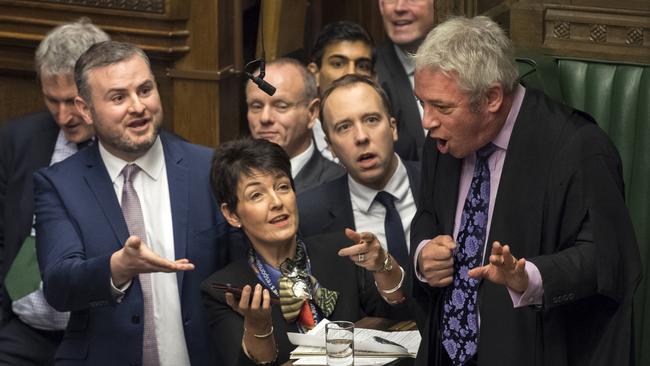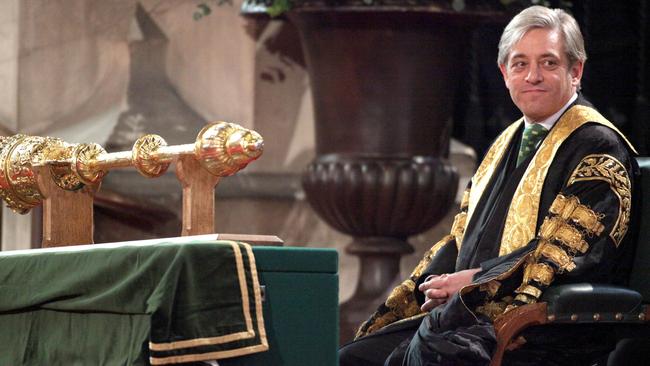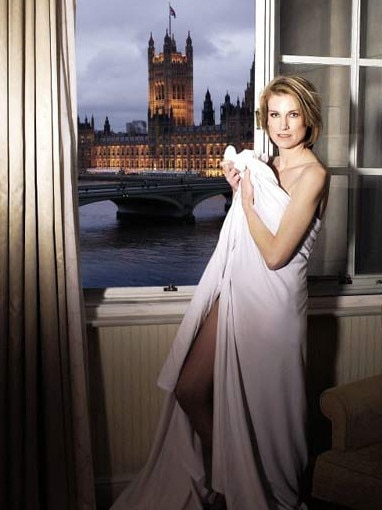John Bercow: uncommonly outspoken
The Speaker of Britain’s House of Commons, John Bercow, has a key role to play in the unfolding Brexit debate.

As the Brexit complexities and uncertainties grind on, one man is becoming increasingly powerful in terms of his impact on Prime Minister Theresa May and her widely derided deal with the EU.
He sits above the Westminster chaos, eschewing the centuries-old elaborate court dress with gold frogging on the sleeves and train in these troubled times, preferring simple black attire, remonstrating with “members chuntering from a sedentary position” or “beetling out of the chamber too quickly”, and making no effort to conceal his displeasure.
This man even described May’s wilful deferral last month of a meaningful vote on her Brexit deal as “deeply discourteous”.
He is John Bercow, the colourful and often contentious politician who is the Speaker of the House of Commons.
It’s his interpretations of what can or can’t be included in various amendments and motions that could have a dramatic impact on how Westminster addresses the Brexit conundrum.
Political analysts are carefully assessing whether Bercow can, or has the will to, allow a Commons coup d’etat against the government by frustrating Brexit legislation with a series of amendments in the coming days.
Labour MP Yvette Cooper’s finance bill amendment this week, aimed at preventing a no-deal Brexit by threatening economic paralysis, was the first of several mooted. Liberal Democrats leader Vince Cable has tabled a similar amendment to stop the Treasury raising income and corporation tax unless Brexit wins parliamentary approval.

It is within Bercow’s power to allow any, all or none of these amendments, which have been designed by increasingly impotent and frustrated Remainers and proponents of a second referendum to effectively veto a no-deal Brexit.
If the strategy is successful, it means May’s winding down of the clock to March 29 is no longer a binary choice between her deal or no deal. Other ramifications could be a Labour-led vote of no confidence in the government and a subsequent general election, or a second referendum.
If the government suffers a defeat in the parliamentary vote on the Prime Minister’s Brexit deal, scheduled to be held next week, it is within Bercow’s remit to decide whether May can resubmit the deal, or declare it dead.
So far he has restricted the number of amendments to the EU withdrawal bill to five of his choosing. If it can no longer be presented to parliament, May will have 21 days to present a plan B, or else Labour’s wishes for a general election will be put in train.
Behind his overly bumptious manner, Bercow is a careful promoter of the idea of parliament keeping the executive, or senior government ministers, in check. His outrage last month against May was triggered by the impression that the executive was overriding parliamentary rights.
Immediately after the Conservative Party withdrew the meaningful vote on Brexit, because it was bound to be defeated by an embarrassingly large margin, Bercow haughtily proclaimed: “I politely suggest that in any courteous, respectful and mature environment, allowing the house to have a say would be the right and, dare I say it, the obvious course to take.” This goes to the heart of Bercow’s desire to rebalance power, something he alluded to when he was first elected Speaker in 2009.
He said: “My overriding objective is to try to strengthen parliament, if necessary at the expense of the power of the executive.” He added that he wanted to see “a stronger, more dynamic and more assertive parliament, where the legislature holds the executive more accountable … than it has in the past”.
In each of the Brexit debates Bercow has allowed every backbencher a question, meaning that May has had to spend hours on her feet arguing her position in response to hundreds of questions.
But Bercow’s often spiky confrontations as he lords it over parliament in much the same imperious way as Judge Judy suffers no fools have occasionally got him into serious trouble. He has been known to refer to several female politicians — including, most recently, the Conservative leader of the house, Andrea Leadsom — as a “stupid woman’’. He apologised, then added: “For my part, I shall continue to speak out openly for the interests of the whole house. And if from time to time it means disagreeing with the government’s management of business, then so be it.”
A one-time merchant banker turned political lobbyist, Bercow has had bullying accusations made against him by staff members and his former private secretary. He has denied all the allegations.
His run-ins with Leadsom include her calling for an investigation into historical complaints and suggesting the process should be overseen not by MPs but an independent body.
Well before the word Brexit existed, and years before the referendum, some of Bercow’s Conservative colleagues fell out with him in spectacular circumstances, often due to his shifting political position. But there has been no hint of serious rebellion. Opposition parties support him because he gives them a fair go, and some grudgingly admire his withering verbal put-downs.
One of these was directed at Philip Hammond, now Chancellor of the Exchequer, when he was a secretary of state. Bercow said: “The administration of this matter has been woefully inadequate and, frankly, utterly incompetent. I have not known a worse example during my tenure as Speaker.
“I know that the secretary of state has expressed himself in his usual, rather understated, terms, but I hope he genuinely does feel some sense of embarrassment and contrition at what has been a total mishandling by his department, for which he is solely responsible — it is as simple as that.”
The 55-year-old has been re-elected unopposed as Speaker three times but he has indicated he is likely to step down mid-year, or once the Brexit issue is resolved.
Politically, Bercow was a hard-right Conservative in his youth, but he has become more socially liberal in recent years. In 2002 he resigned from the Tory opposition frontbench after opposing the Conservative Party whip because he felt there should be a free vote on adoption rights for unmarried couples.
Five years later he joined a Labour committee set up by then prime minister Gordon Brown to review support for children with speech, language and communication special needs. One of his three children, Oliver, has autism, and Bercow takes him regularly to Arsenal football games.
A particularly colourful element of the Speaker’s life outside parliament is his fun-loving wife, Sally.

Sally Bercow briefly left him for his cousin sometime after she appeared on a magazine cover in nothing but a sheet and was quoted as saying that “becoming Speaker has turned my husband into a sex symbol”. She has appeared on various celebrity shows, and in an inflammatory action posted a “Brexit is bollocks” sticker on her car, parked outside parliament during the 2016 referendum campaign. She is a member of the Labour Party and has attempted to run for parliament.
Bercow’s opponents — and there are many — have tried to use his wife’s independence against him. To which he repeatedly and cheerfully replies: “The obligation of impartiality applies to the Speaker of the House of Commons. My wife is not my chattel. She is independent and entitled to her views.”
Unlike in Australia, the Speaker of Britain’s House of Commons is strictly independent. Bercow, first elected to parliament as a Conservative for the blue-blood area of Buckingham, renounced all affiliations to the party, in keeping with tradition, when he was elected Speaker 10 years ago.
That non-partisan mantle, coupled with a strong desire for procedural correctness, will be rigorously put to the test in the coming weeks as Brexit legislation lurches through parliament.
-
Countdown to Brexit
June 23, 2016:
In a referendum, a majority in the UK votes to leave the EU.
March 29, 2017:
Writing to European Council president Donald Tusk, British Prime Minister Theresa May formally triggers Article 50 and begins the two-year countdown to Brexit.
January 15, 2019:
The House of Commons is to vote on a resolution — the “meaningful vote” — on the Withdrawal Agreement and the Political Declaration on the Framework for the Future Relationship. The House of Lords then votes on a motion on both agreements. The European Parliament’s constitutional affairs committee scrutinises the withdrawal agreement.
January 21:
If no agreement has been reached on the withdrawal agreement and/or the political declaration, a minister of the crown must make a written statement within five days. The motion must then be moved within a further five sitting days, meaning parliament would be asked to debate the government’s intended course of action no later than Monday, February 4.
February-March?
The European Parliament votes in plenary on the withdrawal agreement. The withdrawal agreement is concluded by council acting by a super qualified majority (20 of EU27, comprising 65 per cent of the EU27 population).
March:
EU (Withdrawal Agreement) Bill is passed. The bill must be passed before exit to provide the necessary legal framework for the transition/implementation period. The withdrawal agreement is ratified by Britain in accordance with the Constitutional Reform and Governance Act 2010.
March 21-22, 11pm:
European Council meeting.
March 29, 11pm:
Britain is expected to leave the EU. A special summit of the EU27 is expected after the UK formally leaves.
March 30:
The transition/implementation period begins. Trade and future relations talks between Britain and EU.
May 23-26:
European Parliament elections. Britain will not be represented in the EP.
December 31, 2020:
The transition period ends.
December 31, 2021:
British government expects “Irish backstop” to end. Alternative measures to customs should be in place.



